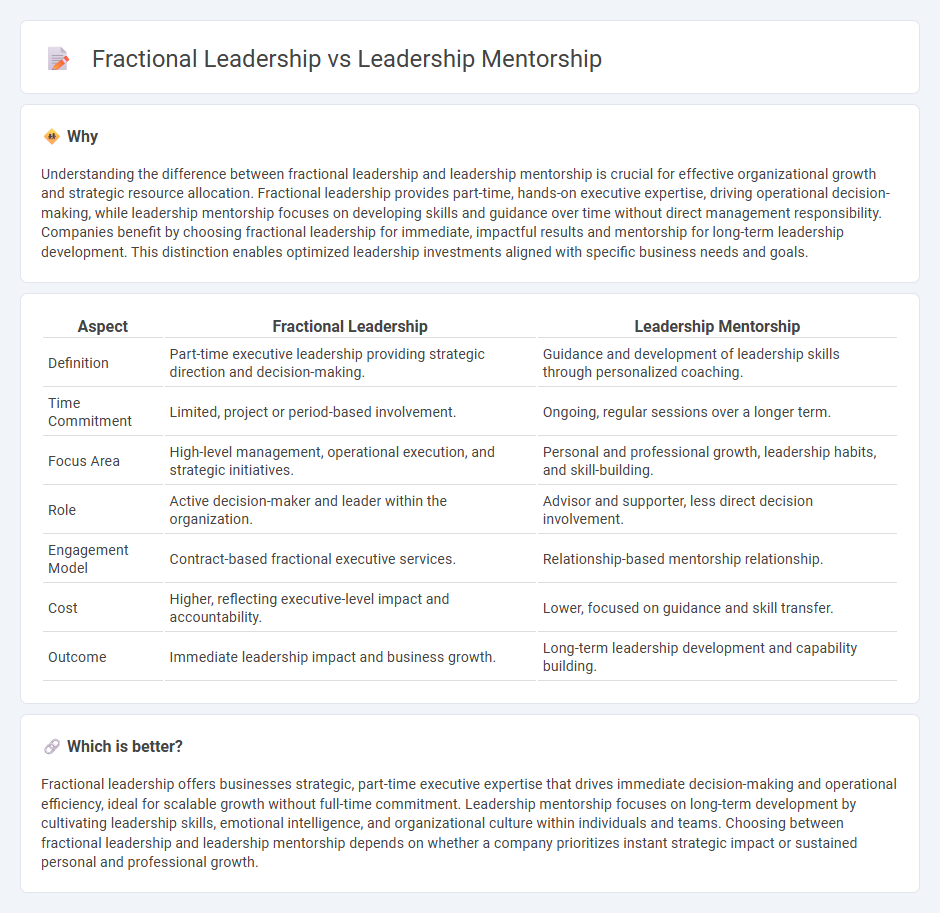
Fractional leadership offers businesses access to experienced executives on a part-time or project basis, optimizing leadership costs while maintaining strategic oversight. Leadership mentorship focuses on developing individual leaders through personalized guidance and knowledge transfer to enhance skills and decision-making capabilities. Explore the differences and benefits of fractional leadership versus leadership mentorship to determine which approach best supports your organization's growth.
Why it is important
Understanding the difference between fractional leadership and leadership mentorship is crucial for effective organizational growth and strategic resource allocation. Fractional leadership provides part-time, hands-on executive expertise, driving operational decision-making, while leadership mentorship focuses on developing skills and guidance over time without direct management responsibility. Companies benefit by choosing fractional leadership for immediate, impactful results and mentorship for long-term leadership development. This distinction enables optimized leadership investments aligned with specific business needs and goals.
Comparison Table
| Aspect | Fractional Leadership | Leadership Mentorship |
|---|---|---|
| Definition | Part-time executive leadership providing strategic direction and decision-making. | Guidance and development of leadership skills through personalized coaching. |
| Time Commitment | Limited, project or period-based involvement. | Ongoing, regular sessions over a longer term. |
| Focus Area | High-level management, operational execution, and strategic initiatives. | Personal and professional growth, leadership habits, and skill-building. |
| Role | Active decision-maker and leader within the organization. | Advisor and supporter, less direct decision involvement. |
| Engagement Model | Contract-based fractional executive services. | Relationship-based mentorship relationship. |
| Cost | Higher, reflecting executive-level impact and accountability. | Lower, focused on guidance and skill transfer. |
| Outcome | Immediate leadership impact and business growth. | Long-term leadership development and capability building. |
Which is better?
Fractional leadership offers businesses strategic, part-time executive expertise that drives immediate decision-making and operational efficiency, ideal for scalable growth without full-time commitment. Leadership mentorship focuses on long-term development by cultivating leadership skills, emotional intelligence, and organizational culture within individuals and teams. Choosing between fractional leadership and leadership mentorship depends on whether a company prioritizes instant strategic impact or sustained personal and professional growth.
Connection
Fractional leadership provides experienced executives on a part-time basis, enabling organizations to benefit from high-level expertise without the full cost of permanent hires. Leadership mentorship complements fractional leadership by offering personalized guidance and development support to emerging leaders within the organization. This connection helps companies cultivate strong leadership pipelines while leveraging strategic insights from seasoned fractional leaders.
Key Terms
Guidance
Leadership mentorship offers personalized guidance through one-on-one coaching and long-term support, fostering individual growth and skill development. Fractional leadership provides strategic direction and hands-on management on a part-time basis, delivering expert leadership tailored to organizational needs without full-time commitment. Explore how each approach can enhance your leadership capabilities and organizational success.
Expertise
Leadership mentorship emphasizes the transfer of expertise through guidance and long-term development, fostering leadership skills via personalized support. Fractional leadership offers immediate access to specialized executive expertise on a part-time basis, enabling organizations to address specific challenges with high-level leadership without full-time commitment. Explore how these distinct models optimize expertise deployment to enhance your organization's growth.
Commitment
Leadership mentorship emphasizes a mentor's commitment to nurturing long-term growth, providing guidance and support to develop leadership skills over time. Fractional leadership prioritizes a strategic commitment, where experienced leaders allocate specific time and expertise to address immediate business challenges on a part-time basis. Explore the distinct roles and commitments in leadership mentorship and fractional leadership to determine the best fit for your organizational needs.
Source and External Links
Leadership Mentoring: Benefits & Best Practices - Discusses the importance of leadership mentoring in equipping managers with the necessary skills to be successful leaders.
Leadership Mentoring: Definition, Importance & Best Practices - Explores the types of leadership mentoring, including traditional one-on-one mentoring and peer mentoring, highlighting their unique benefits.
The Role of Mentorship in Leadership Development - Emphasizes the role of mentorship in providing guidance, support, and real-world experience for novice leaders in case management.
 dowidth.com
dowidth.com